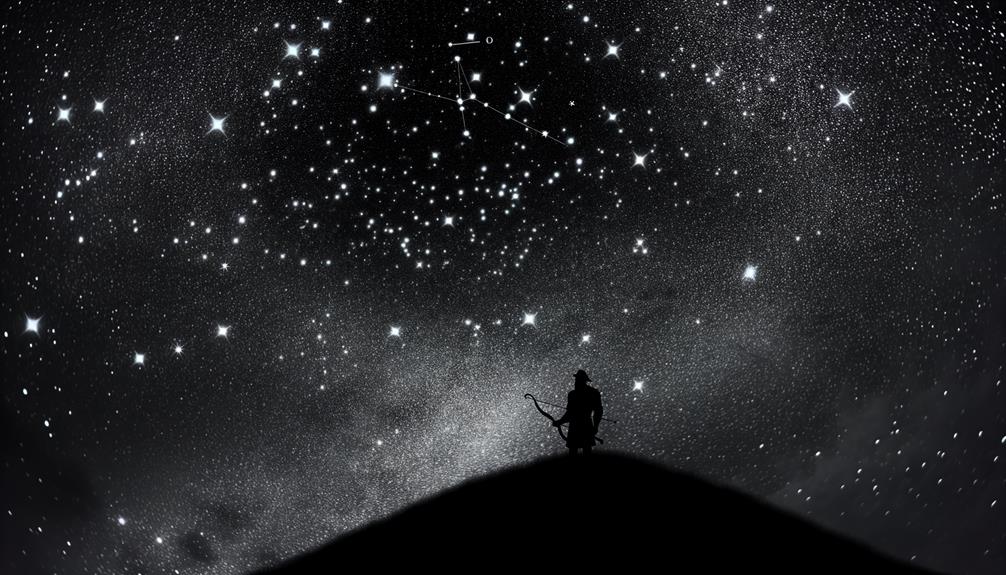Meaning of the Name Orion
The name Orion is steeped in history and symbolism. Originating from Greek mythology, Orion was a legendary giant huntsman famed for his strength and skill.
Linguistically, the name may derive from the Greek word meaning 'rising in the sky'. Astronomically, the constellation Orion, with stars like Betelgeuse and Rigel, serves as a celestial marker and navigational aid.
Orion's presence in literature and modern culture embodies heroism and adventure, bridging myth and empirical science. This rich tapestry of meanings reflects the enduring appeal and depth of the name Orion.
Further exploration reveals even more intricate layers.

Key Takeaways
- Orion is a name from Greek mythology, symbolizing strength and heroism.
- The name Orion is associated with a prominent constellation in the night sky.
- Orion means 'rising in the sky' in Greek.
- Orion reflects cosmic grandeur, drawing from both mythological and astronomical significance.
- The name represents adventure and exploration, inspired by the legendary huntsman and celestial navigation.
Greek Mythology
In Greek mythology, Orion is a prominent figure whose origins and tales are deeply intertwined with the ancient narratives of gods and heroes, illustrating the cultural and historical significance of his name. His name, derived from the ancient Greek 'Ὠρίων' (Ōríōn), carries connotations of grandeur and strength.
Orion's mythological accounts vary, but he is consistently depicted as a giant huntsman of unparalleled skill, often associated with the island of Chios and entangled in stories involving deities like Artemis and Apollo. His tragic demise and subsequent immortalization among the stars reflect the ancient Greeks' reverence for heroic ideals and the cosmos.
The etymology and myths surrounding Orion reveal a complex interplay of linguistic roots and cultural narratives.
Astronomical Significance
The constellation Orion, one of the most recognizable patterns in the night sky, serves as a tribute to the enduring legacy of its mythological namesake, bridging the domains of ancient storytelling and astronomical observation. This celestial formation is prominent in various cultures and has been a navigational aid for millennia. Its brightest stars, Betelgeuse and Rigel, are crucial for both amateur and professional astronomers.
| Astronomical Feature | Significance | Historical Context |
|---|---|---|
| Betelgeuse | Red supergiant star | Indicator of stellar evolution |
| Rigel | Blue supergiant star | Key in studies of stellar lifecycle |
| Orion Nebula | Star formation region | Observed since ancient times for its beauty |
Orion in Literature
Orion's presence in literature spans from ancient Greek epics to modern poetry, symbolizing themes of strength, heroism, and cosmic mystery. In Homer's 'Iliad' and 'Odyssey,' Orion is portrayed as a mighty hunter, his mythic exploits illustrating human virtues and celestial grandeur. This archetype persists in subsequent literary traditions, where Orion often represents an unattainable ideal or a tragic hero.
The etymology traces back to ancient Greek Ὠρίων, reflecting linguistic roots that underscore his pivotal role in myth. In contemporary literature, Orion's constellation serves as a metaphor for exploration and existential wonder. These literary depictions, rooted in historical narratives, enrich our understanding of Orion as an enduring symbol of human aspiration and the mysteries of the cosmos.
Cultural Impact
The cultural impact of the name Orion is multifaceted, spanning from ancient mythology and its celestial legacy to its pervasive presence in literature, art, and modern pop culture.
Historically, Orion's mythological roots have influenced astronomical nomenclature, with the constellation serving as a navigational beacon for various civilizations.
In contemporary times, the name Orion continues to inspire artistic expression and is frequently referenced in popular media, reflecting its enduring resonance across different eras and cultures.
Mythology and Star Legacy
In ancient Greek mythology, Orion was a mighty hunter whose story has been immortalized in both celestial navigation and cultural lore. His narrative is deeply rooted in the etymology of his name, derived from the Greek 'Ὠρίων.'
The constellation Orion, prominent in the night sky, has guided sailors and agrarians for millennia. This celestial formation, including the notable stars Betelgeuse and Rigel, serves as a stellar monument to Orion's mythic exploits.
Historically, Orion's tale of hubris and tragedy, involving deities such as Artemis and Apollo, reflects ancient Greek values and cosmological views. Consequently, his legacy persists not only in folklore but also in the scientific sphere of astronomy, symbolizing a bridge between myth and empirical observation.
Literature and Artistic Depictions
Throughout centuries, the figure of Orion has permeated literature and art, serving as a symbol of both human ambition and celestial wonder.
In classical literature, Orion appears in Homer's 'Odyssey' and Hesiod's 'Works and Days,' reflecting his mythological significance.
Artistic depictions, from ancient Greek pottery to Renaissance paintings, often portray Orion as a towering hunter, embodying both strength and tragic fate.
The etymology of Orion's name, possibly derived from the Greek “ourios,” meaning “rising in the sky,” underscores his celestial ties.
These representations highlight humanity's enduring fascination with the cosmos and our place within it, illustrating how Orion's myth transcends time, influencing cultural narratives and artistic expressions across various epochs.
Modern Pop Culture
Modern pop culture has seamlessly integrated the figure of Orion, leveraging his mythological and celestial legacy to create a multifaceted symbol that resonates across various media and entertainment platforms. This iconic hunter from Greek mythology has transcended his ancient roots, influencing contemporary narratives and artistic expressions. The name Orion, derived from Greek mythology, encapsulates themes of heroism, adventure, and the celestial unknown.
His representation is evident in:
- Literature: Featured in science fiction and fantasy genres.
- Film and Television: Referenced in blockbuster movies and TV series, symbolizing strength and exploration.
- Music: Inspires song titles and lyrics, reflecting cosmic and mythic themes.
- Video Games: Embodies the archetype of the heroic explorer, enhancing the thematic depth of gameplay.
Such widespread adoption underscores Orion's enduring cultural impact.
Modern Usage
In contemporary times, the name Orion has gained notable popularity among parents, reflecting a trend towards names with celestial and mythological significance.
Its presence in modern culture is underscored by frequent mentions in literature, film, and media, where it symbolizes strength and adventure.
Additionally, Orion's astronomical prominence as a prominent constellation continues to inspire fascination and reverence in scientific and amateur stargazing communities alike.
Popularity Among Parents
The name Orion has experienced a notable resurgence in popularity among parents, reflecting a broader cultural fascination with celestial phenomena and mythological references. This trend can be attributed to several factors:
- Astronomical Significance: Orion, a prominent constellation, evokes wonder and exploration.
- Mythological Roots: Derived from Greek mythology, Orion was a legendary hunter, adding a heroic dimension.
- Linguistic Appeal: The name's phonetic harmony contributes to its allure, making it pleasant and memorable.
- Modern Naming Trends: There is a growing preference for unique yet meaningful names, and Orion fits this criterion perfectly.
This multi-faceted appeal positions Orion as a distinguished choice, blending historical depth with contemporary relevance.
Cultural References Today
Reflecting its historical depth and contemporary allure, Orion continues to permeate modern culture through various mediums, including literature, film, and popular media.
Rooted in ancient Greek mythology as a mighty hunter, the name Orion has transcended its origins to symbolize strength and adventure. In literature, it appears in works ranging from science fiction to fantasy, often evoking celestial grandeur.
Cinematically, Orion often features in narratives exploring space and heroism, such as in the films "Interstellar" and "Men in Black." Additionally, various brands and products, from automobiles to technology, adopt the name to convey innovation and reliability.
This enduring legacy underscores Orion's versatile appeal, blending mythological gravitas with modern dynamism.
Astronomical Significance
Amidst the vast tapestry of the night sky, Orion stands out as one of the most recognizable and studied constellations, intertwining its mythological roots with significant astronomical relevance in contemporary science. Orion's prominent features, including the three-star belt, have served as celestial markers for both amateur and professional astronomers. Historically, Orion has been pivotal for navigation and timekeeping.
Modern usage of Orion in astronomy encompasses several key aspects:
- Stellar Formation: Orion Nebula is a primary region for studying star birth.
- Deep-Sky Observations: Hosts various nebulae and star clusters.
- Variable Stars: Betelgeuse and other stars in Orion show variability, offering insights into stellar life cycles.
- Exoplanet Research: Orion's stars are targets for exoplanet studies.
This intricate interplay between history and modern science underscores Orion's enduring legacy.
Symbolism and Legacy
Rooted in ancient mythology, the name Orion carries profound symbolism, encompassing themes of strength, heroism, and celestial grandeur that have been celebrated across various cultures throughout history.
In Greek mythology, Orion is portrayed as a mighty hunter, whose image was immortalized in the night sky, reflecting human admiration for bravery and resilience. The constellation Orion, visible from nearly every inhabited part of Earth, has been a navigational beacon and a symbol of cosmic order.
Linguistically, the name Orion may derive from the Greek word 'ourios,' meaning 'rising in the sky,' emphasizing his celestial significance. This legacy has permeated literature, art, and popular culture, affirming Orion as an enduring symbol of human aspiration and the timeless allure of the stars.
Conclusion
To sum up, the name Orion, originating from Greek mythology and immersed in astronomical importance, acts as a guiding light through the pathways of literature and cultural history.
Its present-day utilization and lasting symbolism emphasize Orion's significant heritage, which still lights up the human imagination akin to the constellation in the nocturnal heavens.
This complex array of significances emphasizes the name's ageless allure and its lasting position in both past and present circumstances.






